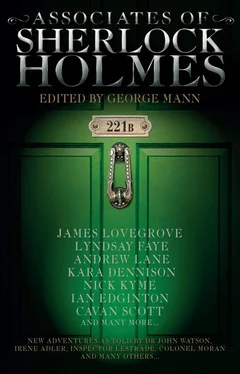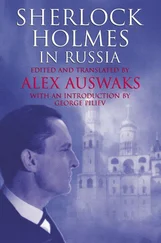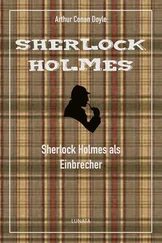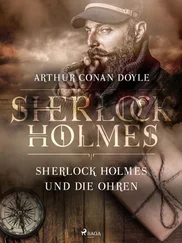“Precisely, Inspector. Stitched into the lining of his jacket, which is why Duggen missed it.”
“He’s gone back there. To Alderbrook,” I realised, catching up to Holmes’s train of thought at last. “It’s empty on account of the fire, but he’d still need to wait until after dark. He’s still after the money.”
“Trusting to Goose’s lockbox to have protected it from the blaze,” said Holmes.
“He’s still there, he must be,” I said, grabbing my coat. “I’d wager my reputation on it.”
“A modest bet, Inspector,” said Holmes, “but a hansom cab awaits to take us.”
* * *
By the time we reached Lower Thames Street, the day had almost ended and night was creeping in. What scant light remained made a hollow of the old workhouse, burnt and blackened. Roof beams had become exposed to the elements, jutting outwards like rib bones. Rats and vagrants made their lair here now, and somewhere amongst them was Morris Duggen.
“Shouldn’t we wait for your men, Inspector?” asked Watson as we paused at the threshold. I had sent Cooper off to find Metcalfe and have him rouse as many constables as he could.
I shook my head. “I won’t risk him getting away again,” I said. “We’ll have to be enough to apprehend him.”
Holmes nodded, having drawn a pistol. Both Watson and I were also armed. “Then let’s be at it, gentlemen,” said Holmes, and we entered the ruins of Alderbrook. It was dark within, and we dared not risk any light for fear of alerting our quarry, so we made do with what little illumination penetrated from the outside.
The entrance hall was deserted, and I saw Watson move off to the right to look through a gutted doorway. He shook his head, indicating that the room beyond was empty. Holmes took the left as I pressed ahead to the stairs. It was then that we heard it: a faint scuffing against the wooden boards. It was coming from above.
“I don’t think he’ll be expecting us,” said Watson.
“Then let’s keep it that way, Doctor,” I replied and advanced up the stairs.
I led us on. As we ascended a stairway with a broken railing, I saw what looked like an office at the end of a long gallery and realised that this was where the scuffing sounds were coming from. Doors, some shut, some black and broken, led all the way down on one side. On the other, the railing continued, some of its balusters burnt down to little more than nubs.
Here in its upper reaches, Alderbrook was open to the sky, and I felt the wind catch my overcoat and the rain against my face as I approached the office at the far end of the gallery. The door to the room was open, broken on its hinges, and I could see a shadow moving around within. As we got closer, I thought I saw it pause, only to continue whatever it was doing a moment later.
“Are you gentlemen ready?” I asked as we neared the open doorway. Both nodded and I stepped through, preparing to render unto Duggen the full justice of the law, but something struck my weapon, wrenching it from my hand before I could shoot.
A hand clamped around my wrist and I was yanked off my feet, into the office and against the facing wall. Pain tore through my shoulder as it bore the brunt of my fall, and I collapsed in a heap.
I saw Duggen. He glanced at me once, a snarl on his shapeless lips, and I beheld a face so monstrous I now knew why he chose to hide behind a dead man’s skin. He had a melted lockbox under one arm, a chisel in his hand, and he barrelled out of the room like a Smithfield bull.
I saw Watson raise his pistol but, upon seeing the horror of Duggen’s face, delayed his shot. The bullet struck Duggen in the same shoulder where I had clipped him before – even in the dismal half light, I saw the spurt of blood – but as before he barely slowed, barging Watson off his feet and sending him crashing through the blackened balustrade.
Holmes cried out, “Watson!” and there was a second shot.
I thought the doctor had been pitched over the edge to his certain death until I saw Holmes scrambling to grasp Watson’s wrist as he clung on perilously.
Duggen left them, limping now, and I realised Holmes must have clipped him before going to the doctor’s rescue.
I got to my feet, still groggy from being thrown across the room. Duggen had left a gaping hole in the floor from where he’d smashed through to claim the lockbox. I staggered to the doorway, remembering to retrieve my pistol.
“Holmes?” I asked, seeing him slowly wrenching Watson to safety. Duggen meanwhile was fleeing across the gallery.
“All is in hand here, Inspector,” Holmes assured me breathlessly. “To your duty.”
I went after Duggen and got halfway down the gallery when I held my pistol outstretched and declared, “Halt! In the name of the law, halt or I will shoot!” I wanted to kill this man for all the ills he had inflicted upon London, and most especially for the death of Constable Barrows, but I would have justice not revenge.
Duggen stopped. With his limp slowing him, we were but a few feet or so apart. I heard the floorboards, so ravaged by fire, creak ominously beneath us and knew I had to get him down quickly.
Then he turned.
A malformed face greeted me. Its flesh was raw and twisted, and reminded me of melted wax. He didn’t speak, and it occurred to me he might not possess the faculty to do so, given the severity of his scars. But instead of holding up his hands, he brandished the chisel and took a step towards me.
“Halt! I warn you, Duggen!”
Duggen kept going, limping towards me at a steady pace. I fired, or would have, but the pistol clicked deadeningly in my grasp and despite my frantic efforts I could not get it to shoot. Duggen grinned as he advanced on me, his red raw lips peeling back over his teeth. I drew my cosh, preparing to defend myself…
I felt the slightest tremor run through the wooden boards underfoot. Duggen felt it too and reached out to grasp the balustrade, dropping the chisel as his grotesque face contorted. I kicked the railing, hard enough to split it from its foundations. Duggen stumbled as the railing collapsed in his grasp. He teetered, one arm flailing, the other cradling the lockbox until at last pitching over the edge.
“Holmes?” I yelled.
“Here, Lestrade.”
“And the doctor?”
“Present, Inspector,” said Watson.
I carefully went over to the broken balustrade and looked over the edge. Morris Duggan lay broken on the floor below, his neck twisted at an awkward angle. The lockbox had split apart as it hit the ground and the stolen notes from the London and Westminster still fluttered in the wind before finally settling on the corpse.
“He’s dead,” I told them, and only then felt my hands begin to tremble. I sagged against a doorway as the shouts of Sergeant Metcalfe and my constables appeared below, and murmured gratefully, “the Peeler is dead.”
* * *
I saw little of Holmes and Watson after that night. After several days of gruelling police work, all of the flesh garments wrought by Duggen and sold by Wainwright were recovered and destroyed. Though it could not be proven, it was widely believed by those involved in this investigation that Morris Duggen had used the skin of several other men and women in his wretched flesh trade, but post mortem. Only the larcenous deeds of Jeremiah Goose had brought the killer out in him, though I suspect it would only have been a matter of time regardless. It turned out, Goose did know Wainwright, the latter owing gambling debts to the former and hence Goose’s desire for recompense that in the end led to his death.
The stolen money was returned to the London and Westminster, a modest sum, but it had been enough for Duggen to kill his partner. In the end, through perfidy and misadventure, both men were spared the noose, a fact that rankles me but also lets me sleep more soundly knowing they are dead.
Читать дальше












